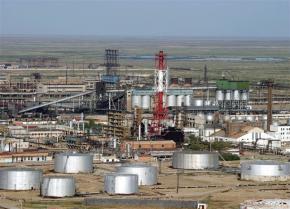ID :
103490
Sat, 01/30/2010 - 01:14
Auther :
Shortlink :
http://m.oananews.org//node/103490
The shortlink copeid
Iran sees oil above $60 in 2010

TEHRAN, Jan. 29 (MNA) -- Iran’s OPEC governor said on Friday that oil prices would not drop below $60 per barrel in 2010.
The Mehr news agency quoted Mohammad-Ali Khatibi as saying that though oil prices are expected to decrease in the first half of the year because of seasonal demands but it would not go under $60 per barrel.
“It is predicted that the crude oil market would gain ground in the second half of 2010,” he added.
Iran has planned next year’s budget based on an oil price of $60 per barrel, nearly double the price from last year.
Last year, the parliament approved a budget based on $37.5 per barrel.
About 80 percent of Iran’s foreign revenue comes from oil exports and the economy was severely impacted by last year’s low prices.
Oil was steady near $74 on Friday, but headed for a third consecutive weekly drop, as the recovery of the U.S. economy has yet to boost fuel demand.
Prices fell on Thursday after the U.S. dollar rose to the highest in more than six months against the euro, which fell on concern over potential fiscal crises in European economies including Greece and Portugal.
A stronger dollar often indicates investors are funneling cash away from riskier assets such as commodities. It also can curb demand for crude oil from buyers who hold other currencies, since oil is priced in dollars.
The Organization of the Petroleum Exporting Countries announced late in 2008 it was implementing record oil output cuts of 4.2 million bpd from September 2008 production to bolster prices.
As oil prices climbed during 2009, OPEC adherence to the cutbacks has fallen to below 60 percent from above 80 percent in 2009, according to industry estimates.
The Mehr news agency quoted Mohammad-Ali Khatibi as saying that though oil prices are expected to decrease in the first half of the year because of seasonal demands but it would not go under $60 per barrel.
“It is predicted that the crude oil market would gain ground in the second half of 2010,” he added.
Iran has planned next year’s budget based on an oil price of $60 per barrel, nearly double the price from last year.
Last year, the parliament approved a budget based on $37.5 per barrel.
About 80 percent of Iran’s foreign revenue comes from oil exports and the economy was severely impacted by last year’s low prices.
Oil was steady near $74 on Friday, but headed for a third consecutive weekly drop, as the recovery of the U.S. economy has yet to boost fuel demand.
Prices fell on Thursday after the U.S. dollar rose to the highest in more than six months against the euro, which fell on concern over potential fiscal crises in European economies including Greece and Portugal.
A stronger dollar often indicates investors are funneling cash away from riskier assets such as commodities. It also can curb demand for crude oil from buyers who hold other currencies, since oil is priced in dollars.
The Organization of the Petroleum Exporting Countries announced late in 2008 it was implementing record oil output cuts of 4.2 million bpd from September 2008 production to bolster prices.
As oil prices climbed during 2009, OPEC adherence to the cutbacks has fallen to below 60 percent from above 80 percent in 2009, according to industry estimates.





